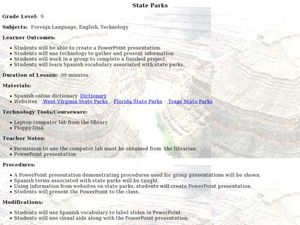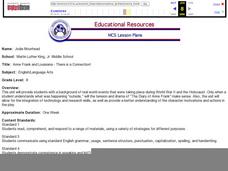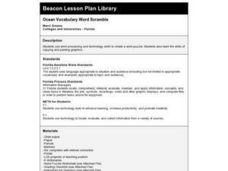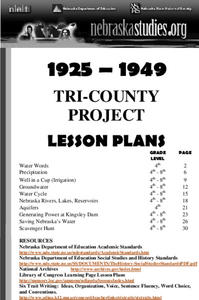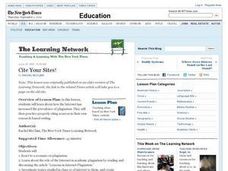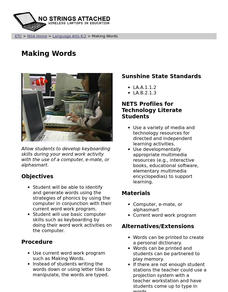Curated OER
Acrostic Poems: What's In a Name?
Students find words that begin with the letters in their own names, using a variety of sources including word banks and online dictionaries. They create an acrostic poem. Pupils revise poems as needed, for meaning and conventions. ...
Curated OER
Spanish - Imperative vs. Preterite Tense
Twelfth graders take an online quiz using a website where they differentiate between preterite and imperfect tenses in Spanish. For this Spanish lesson plan, 12th graders use their computer skills and Spanish skills.
Curated OER
Looking at Lewis and Clark
Fifth graders review information on Lewis and Clark by using a variety of resources. With partners, they travel between stations researching different information based on the expedition. They check each others work and share it with the...
Curated OER
Clown or Comedian
Students discover how to compare and contrast the differences between a clown and a comedian. They use dictionaries to expand their vocabulary.
Curated OER
State Parks: A Spanish Vocabulary Lesson
Ninth graders create a PowerPoint about state parks using Spanish vocabulary. In this Spanish instructional activity, 9th graders work in groups to research about area recreational facilities. Students use information collected on-line...
Curated OER
Anne Frank and Louisiana - There is a Connection!
How is Louisiana connected to the Holocaust? After reading The Diary of Anne Frank, eighth graders complete a research report about a survivor of the Holocaust who currently resides in Louisiana. Though the idea is a good way to...
Curated OER
Planning A Vacation Online
If you could travel anywhere in the United States, where would you go? Use this question to interest your fourth, fifth, and sixth graders as they experiment with Mapquest or other direction-based resources. They choose where they'd like...
Curated OER
Bryant Creek Watershed Project - Making a Karst Dictionary
Students explore the definitions relevant to Karst topography. They develop a Bryant Watershed Dictionary of the special words and terms that are used to talk about the topography and hydrology of the area they live in.
Curated OER
The Dictionary Game
Students play The Dictionary Game--also called Balderdash as a way to learn new vocabulary words.
Curated OER
How To Use the Internet To Make Student Glossaries
Middle schoolers use an internet dictionary to produce a glossary of words related to a particular subject area being studied. They choose the correct meaning of the word for their glossary, based on it's relationship to the subject...
Curated OER
Ocean Vocabulary Word Scramble
Students visit a puzzle maker website and follow a list of instructions, creating a word scramble using sea animal vocabulary. They copy and paste graphics at the bottom of their puzzle, and print them out for other students to solve.
Curated OER
Ingredients of a Mystery
Learners explore the concept of mysteries. In this mystery genre lesson, students identify the common characteristics of mystery books and use a story map to identify these characteristics in a given book. Learners also...
Curated OER
How can we write a silly story?
Second graders use the writing process and create a silly story. In this silly story instructional activity, 2nd graders will review person, event and setting and complete a chart for each. Students will put a person,...
Curated OER
Angles That Pair
Students identify angles. In this angles that pair lesson, students identify adjacent, vertical, complementary, and supplementary angles. They use straws, pretzel sticks to demonstrate given types of angles.
Curated OER
Water Words
Young scholars define words relating to water and its use in Nebraska. They listen to the story, Snail Girl Brings Water, list the water words from the story, and create a class dictionary.
Curated OER
Minibeasts and Reading Strategies
Fourth graders explore reading strategies through roleplaying. In this reading lesson, 4th graders read Wings, Stings, and Wiggly Things by Martin Jenkins. Student groups pretend to be a law firm and identify words as their evidence to...
Curated OER
The Ins And Outs Of Area And Perimeter
Fifth graders demonstrate the concept of perimeter and area using manipulative. In this area and perimeter lesson, 5th graders explore area and perimeter through the exploration style of teaching using eatable and non-eatable...
Curated OER
Wolf Fact Cards
Students write a non-chronological report about wolves. They read and discuss wolf fact cards in small groups, complete a KWL chart, observe the teacher model the steps of writing a report, and conduct research and write an original...
Curated OER
Sensitive Taste Test
Fifth graders investigate concentrated and diluted solutions by conducting a taste test. In this dilution lesson, 5th graders examine the concentration of different juices samples by tasting them and recording their observations....
Curated OER
'Round and 'Round it Goes!
Students discuss and interpret background knowledge on poster copy given on the water cycle. Students complete the included activity sheets using the poster as a reference in small groups. Students identify and name where water can be...
Curated OER
Building a Terrarium System
Young scholars create their own terrariums. In this ecological model instructional activity, students create terrariums using soil, seeds, pebbles, and two liter bottles. Young scholars compare the elements of a...
Curated OER
Cite Your Sites
What information would you find in an almanac that you would not find in an atlas? What is the difference between a dictionary and a thesaurus? Using a Cite Your Sites worksheet on which they record their observations, groups participate...
Curated OER
An Illustrated Guide to the Late 1800's
Eleventh graders investigate the time of the late 1800's. They conduct research using a variety of resources that could include the internet. Students create an alphabetized encyclopedia of important historical people of the time period.
Curated OER
Making Words
Young writers identify and generate words using the strategies of phonics on the Making Words computer program. Words are typed instead of having to use tiles or paper. Extension activities such as playing the memory game, drawing...




